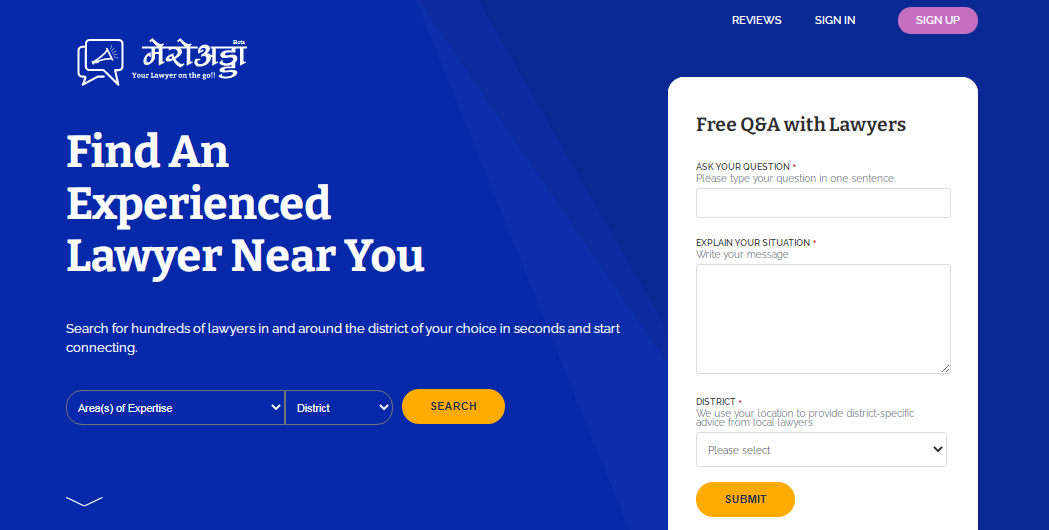Be it opening new ventures, complaining about a product or service as a consumer, or getting parental property, the law touches every aspect of our life. Yet, going through the legal documents to understand relevant provisions is one of the toughest reading for many of us.
The legal profession is more specialized than it looks. Hence, finding a lawyer who can explain to us the case is far too complicated.
To fix this challenge, few youths in Nepal have initiated a legal technology venture which aims to make the law accessible to everyone.
Aalok Subedi, Santosh Giri, and Sanjaya Singh, co-founders of SiliconHire have been working to simplify legal terminologies and provision for the general public.
Their companies are named SiliconHire LLC in the US and SiliconHire Pvt. Ltd. in Nepal.
What SiliconHire does?
The venture develops legal technology software, provides legal process services and outsourcing, and develops legal literacy among people from different walks of life.
Their products include AutoPAF®, Smart Law 2.0, MeroAdda.com, and WageCounty.com.
The venture is new to the Nepali market, so among all the products, MeroAdda.com has been already launched here and is functioning actively.

“The tagline of MeroAdda is ‘Nepal ko Kanoon, Sabaile Janoon’ (Every citizen of Nepal has to know the state’s law),” says Subedi.
MeroAdda has been designed to bridge the gap between general people and lawyers. Through this online portal, anyone can share and get answers from the lawyers from respective domains for free.
Similarly, they also have the YouTube program ‘Law Kura Garaun’ (Let’s Talk about Law). Here, the host discusses details of different articles in the constitution and law thoroughly. “Soon, this show will be broadcasted in a national broadcasting channel as well”, shares Subedi.

MeroAdda also simplifies the articles and legal concepts not only in the constitution but also in al other existing Acts and Laws through its posts to bring legal literacy among social media users. They explain the legal provisions in layperson terms through its Facebook page, Instagram, Twitter and Viber Group.
MeroAdda also provides professional services including company registration for small and medium enterprises (SMEs) and startups and facilitates Foreign Direct Investment (FDI) for SMEs. Besides, they work on company amendment, company closure rental agreement, design/patent/ trademark, and social welfare council registration.
Apart from that, two of their products AutoPAF® and WageCounty are working for the US market. While AutoPAF® provides automated Public Access File Creation, Wagecounty helps generate the various wages (levels) of every professional for every county in the US according to the rule of law.
Similarly, Smart Law 2.0, which will be working on the Case Management System is in the process of research and development. The first version of Smart Law was already introduced back in 2001 by one of their co-founder Giri.
The beginning
With an eagerness to explore abroad, Subedi went to the US to study BBA in 2007. In 2011, he met his co-founder Giri, who was already in the legal field, and later met another co-founder Singh in 2015.

Giri, CEO at SiliconHire LLC USA has been a Corporate Immigration Specialist in the USA and founder of SmartLaw (2001) in Nepal – the country’s first Case Management System.

Similarly, Singh is the Global CTO of the venture. He has 15 years of experience in the Technology domain working with multiple global companies including HP (Hewlett Packard) and Thomson Reuters. He joined US Entity in 2015 and returned to Nepal to serve through Nepal Entity in April 2018.
“As I was not from a law background, I had to make a lot of effort to understand its details,” Subedi says. At that time, even in the US, the startups used to procrastinate legal compliance, because of tedious manual processes.
Consequently, they started their venture in the US as SiliconHire LLC to solve loopholes in the legal space. They started by providing legal professional and HR services and designed legal tech products like AutoPAF® and Wagecounty.
Few years passed, and the trio thought about expanding this idea to their own country, where there was no presence of any kind of legal tech.
Subedi followed his instinct and came back to Nepal in 2017. Similarly, Singh also returned in 2018. They met lawyers, talked with common people, and learned more about Nepali law and provision before commencing.
“Though Legal Technology holds a much wider scope, in Nepal we have started by designing a product ‘MeroAdda’ in 2019, targeted to the general public”, Subedi says. Of their all features, Free Q&A with Lawyers has been gaining popularity among the general public.
Q &A with lawyers
Here, the general public can share their legal queries with lawyers for free just by logging in to Meroadda.com. They can search for lawyers in a district who hold certain specialization. Similarly, lawyers and attorneys can sign up and give answers to the questions.
The questions can be regarding anything which involves legal issues. The notification of the queries will be sent to the lawyers via email. They answer the question as per their expertise. For example: if somebody shares their queries related to the e-Commerce policy, ICT lawyers will be answering the questions.
“For now, we send the questions to all the lawyers. But very soon, we will classify the questions and send them only to the lawyers according to their area of specialization,” says Subedi.
The team is also working to make the answers indexable so that the Q&As will be displayed when anyone Googles the queries. “Currently, one needs to sign up to MeroAdda.com to get access to the answers. But soon, this will start showing up on a simple google search,” shares Subedi.
Free platform
There is no form of commercial transaction involved in this process, unlike the traditional process where one has to pay to get the answer to their queries in the law firm. The ones who asked the question will get their answers on the website and get notified through their email. The answers are available on the website for anyone to login and go through.
How Lawyers engage?
The lawyers can sign up and register themselves. According to him, mostly young lawyers with experience of around 10 years have been signing up for the platform.
Every lawyer who has signed up has a detailed profile on the platform. “Though the lawyers have to provide their answers for free, the website gives visibility to them based on their area of specialization,” shares Subedi.
For instance: if somebody has queries related to parental property, they can visit the website and ask the question. And when a lawyer from a specific domain answers the question, there are more chances that the person might approach the lawyer directly to file the case.
Thus, this is a win–win situation for both the general public and legal professionals.
“Till now 28 lawyers have voluntarily signed up on the platform”, says Subedi.
Making company registration process easier
According to the Doing Business Report 2020 , Nepal comes in the 94th position out of 190 economies across the world. According to the World Bank, high ease of doing business ranking means that the regulatory environment is more conducive to the starting and operation of the local firm.
Though Nepal has been improving its position every year, the registration process, understanding legal compliance, investment exits, and closing the company is not an easy task. The rules and regulations for startup companies are written nowhere. But there are instances where the startups have been fined for skipping registration processes.
MeroAdda, through its professional legal services, has made it convenient for small companies, especially innovative, scalable and tech-enabled companies to register themselves to different government bodies.
“In Nepal, the company registration process goes smooth only if one has good networks with the concerned government officials. So, most of the startup founders face a hard time at the beginning itself,” shares Subedi.
With MeroAdda, the companies can complete registration within 15 working days. The team also shares updates with the clients about the procedures through email. Soon, we are also developing a system where we can track the procedures and share them with the founders, he says.
The team also reminds the companies about three months and annual compliances. “Usually, the CEOs of startups have to do everything by themselves and they forget the compliance works. Our role is to ensure they meet all the legal compliance on time,” says Subedi.
MeroAdda has provided professional legal service to more than 50 small and medium companies. The charge starts with Rs 5,000 to Rs 3,00,000 depending on the service. “But we don’t strictly charge the same price for everyone. We provide discounts of 25 percent to 50 percent for companies and individuals with lesser financial strength,” he shares.
Revenue model
The company earns revenue through legal process outsourcing, where they deal with clients from the US. Besides that, they charge for legal professional services in Nepal as well.
Also, they are soon starting paid services on MeroAdda.com. One of the services which they are soon going to launch is designing Do It Yourself (DIY) contracts that fit the company’s specific situation or individual.
ALSO READ: Netrakart: This Eyewear Startup Wants to Make Home-based Eye Checkup Mainstream in Nepal
Challenges
Technology has been disrupting almost all industries, but they are equally facing challenges, especially, when it comes to policy. “Technological progress is so quick that we have to keep changing policies to adapt to it. Thus, the government needs enough research while they frame policies,” says Subedi.
“According to the code of conduct of Nepal Bar Council, lawyers and advocates in Nepal cannot advertise themselves. But, the provision is not clear for today’s world where everyone can boost their profiles through social media”, opines Subedi.
Also, the lawyers themselves don’t understand the significance and efficiency of adopting legal technology, he says.
He views that a new policy has to be designed in such a way where Bar Council, Nepal Bar Association, and Legal Technology can work together. “The policy should encourage people to enter the legal technology space,” he shares.
Future plans
In the long run, the team is planning to develop advanced legal tech products. But their plan has to be backed by strong policy from the government. For instance, “We can replicate WageCounty in Nepal. But for this, the government needs to set the hourly/daily/monthly remuneration for every single profession in Nepal”, he shares.
Some recent plans are paid services like DIY contracts, automated systems to track legal professional services, and Case Management Systems for Law Firms.
READ NEXT: Neemacademy: This Edutech Startup is Working to Build e-Learning Culture in Nepal
-
MG Windsor EV Launching in Nepal This MayHIGHLIGHTS MG Windsor EV is a Compact Utility Vehicle (CUV). Windsor EV is powered by…
-
Mahindra BE 6: Mahindra’s Engineering Might Unleashed, Expected in Nepal by 2025HIGHLIGHTS Mahindra BE 6 is an unorthodox electric SUV. BE 6 is available in Pack…
-
Motorola Moto G05 Finally Arrives in Nepal — A Budget Phone from a Trusted Brand!HIGHLIGHTS The Motorola Moto G05 price in Nepal is Rs. 12,999 (4/64GB). It has MediaTek…










